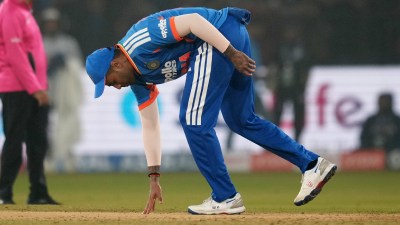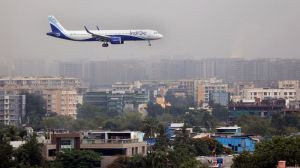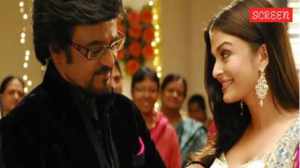WhatsApp groups to raising funds: How a group of doctors are fighting for justice, minus politics
The West Bengal Junior Doctors’ Front, a general body of medicos from across the state, has been spearheading the fight, holding daily meetings to discuss strategy, raising funds to keep the movement going and coordinating with supporters from across the globe via “official” WhatsApp groups.
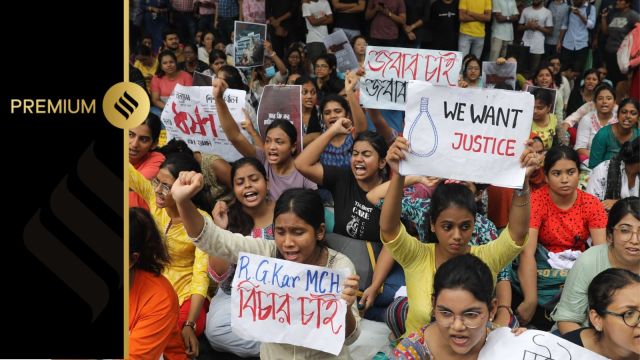 The protests were initially about demanding an inquest before their colleague’s body was handed over for post-mortem, but soon turned into a rallying cry for justice and the safety of healthcare workers. (Express Photo)
The protests were initially about demanding an inquest before their colleague’s body was handed over for post-mortem, but soon turned into a rallying cry for justice and the safety of healthcare workers. (Express Photo)Under a bamboo canopy, surrounded by posters, messages and an altar dedicated to the junior doctor who was raped and murdered inside the fourth-floor seminar hall, a movement has been brewing since the discovery of her body on August 9 at Kolkata’s R G Kar Medical College & Hospital. What started as a spontaneous protest by her colleagues on August 9, has turned into a 24/7 movement for justice — a largely apolitical one — opposite the Emergency building at R G Kar itself.
The West Bengal Junior Doctors’ Front, a general body of medicos from across the state, has been spearheading the fight, holding daily meetings to discuss strategy, raising funds to keep the movement going and coordinating with supporters from across the globe via “official” WhatsApp groups. Through all this, they have been facing several challenges — from attempts by a section of the hospital administration to stop the protest to mob-led vandalism on campus late on August 14 and requests from their families to come home.
The agitators say the movement started with nearly 300 postgraduate trainees (PGTs) at R G Kar protesting on campus soon after the doctor’s body was discovered. The protests were initially about demanding an inquest before their colleague’s body was handed over for post-mortem, but soon turned into a rallying cry for justice and the safety of healthcare workers.
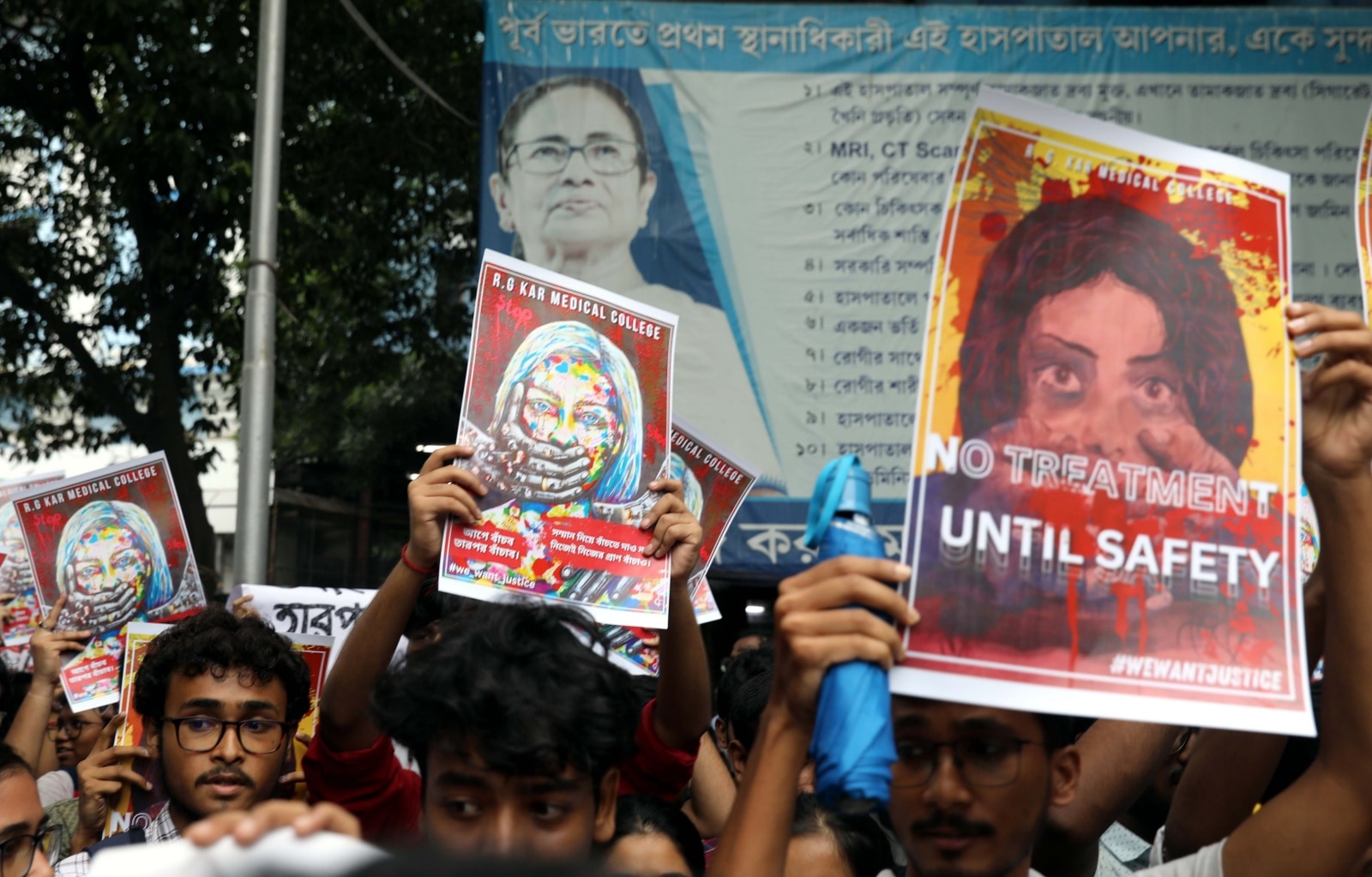 Doctors, Students , Interns and health workers of RG Kar Medical College and Hospital during the protest at the hospital premises in connection with a doctor killed inside the hospital, in Kolkata. (Express Photo by Partha Paul)
Doctors, Students , Interns and health workers of RG Kar Medical College and Hospital during the protest at the hospital premises in connection with a doctor killed inside the hospital, in Kolkata. (Express Photo by Partha Paul)
Anupam Roy, a junior doctor and a protest leader, told The Indian Express, “We felt the police and the hospital were trying to underplay the incident, so we decided to turn our protest into a movement. However, we were clear about one thing from the start — our fight was for justice and that it had to remain completely apolitical.”
Which is why, says Dr Roy, there are no political flags, banners or even known faces at their protest site inside the hospital. “They (political parties) are free to protest outside the hospital. If they want to join us, they have to come without any political affiliations.”
Which is why, the Left-wing Democratic Youth Federation of India (DYFI) had put up a stage opposite the hospital — which was dismantled by Kolkata Police after the August 14 vandalism — and the BJP staged a dharna at the nearby Shyambazar 5-Point Crossing.
 What started as a spontaneous protest on August 9, has turned into a 24/7 movement for justice — a largely apolitical one — opposite the Emergency building at R G Kar itself. (Express Photo by Partha Paul)
What started as a spontaneous protest on August 9, has turned into a 24/7 movement for justice — a largely apolitical one — opposite the Emergency building at R G Kar itself. (Express Photo by Partha Paul)
Mrinmoy Basak, a PGT student at Calcutta National Medical College (CNMC), says, “We have no problems with anyone’s political affiliations and flags. But before they join our movement, they need to leave their flags and affiliations outside the campus.”
On August 9, Day One, Dr Roy says, some doctors aligned with the Trinamool Congress Chhatra Parishad (TMCP) tried to stop medical personnel from outside R G Kar from joining the protest. “They wanted to keep the movement confined to just R G Kar personnel so that no outsider would have raised slogans against the hospital. We decided to distance ourselves from them,” he says.
During a general body meeting on August 10, almost 300 protestors, including healthcare professionals and students from other colleges across the state, submitted a deputation to former R G Kar principal Sandip Ghosh, demanding a free and fair inquiry into their colleague’s death, besides the resignation of seniors officials, including Ghosh, over “administrative failure”.
These moves were met with resistance. A section of Ghosh’s supporters walked out of the meeting, says Dr Suvendu Mallick, an alumnus of R G Kar and a chest physician. A junior doctor present at the meeting says some doctors started raising slogans against the presence of “outsiders” and R G Kar alumni.
 The agitators say the movement started with nearly 300 postgraduate trainees (PGTs) at R G Kar protesting on campus soon after the doctor’s body was discovered. (Express Photo by Partha Paul)
The agitators say the movement started with nearly 300 postgraduate trainees (PGTs) at R G Kar protesting on campus soon after the doctor’s body was discovered. (Express Photo by Partha Paul)
An R G Kar PGT student says, “Some even tried to stop us from shouting slogans against the state and the police. These attempts almost killed the movement — representatives from other medical colleges almost decided to walk away. However, these voices were eventually subdued and we officially decided to keep our protest apolitical.”
The West Bengal Junior Doctors’ Front, says Dr Mallick, has 11 members from R G Kar and five representatives from each of West Bengal’s 23 medical colleges, including private and government, says Suman Mondal, a second-year PGT at Kolkata Medical College and Hospital. The front holds a daily general body meeting to decide their next strategy. On August 10, the front decided to “cease” work. This continues despite the Supreme Court’s appeal to return to work “full time”.
 There are no political flags, banners or even known faces at their protest site inside the hospital. (Express Photo by Partha Paul)
There are no political flags, banners or even known faces at their protest site inside the hospital. (Express Photo by Partha Paul)
Dr Tuhi Hazra, a final-year undergraduate student at R G Kar, says, “Since we are agitating 24/7, we are taking turns to sit at the site. We are also attending to emergency and in-house patients. Only OPDs have been boycotted. It is not an easy task, but seeking justice is never easy.”
The movement suffered a setback when a mob of nearly 500 people went on the rampage at the hospital on August 14. Fearing for their safety, most student doctors went back home and only 10 per cent of around 700 junior doctors remained on campus. After the recent CISF deployment, some have started to return, say the protestors.
Dr Hazra too was asked by her family to come home after the attack. “I refused to go back, telling them that it could be me tomorrow,” she says.
For better coordination, the protestors have created WhatsApp groups. R G Kar alone has five WhatsApp groups, besides the three separate WhatsApp groups under the banner of the West Bengal Juniors Doctors’ Front, which have over 1,000 members, says Dr Mallick.
The protestors have formed a body, the Abhaya Action Committee, to raise funds to sustain the 24/7 protest — from buying hoarding spaces (two of which adorn the Emergency building) and renting a sound system at the site to money for rallies outside the hospital and hiring lawyers to attend the suo motu hearing in the Supreme Court. Besides R G Kar’s undergraduates, who have contributed Rs 77,000 from their Hostel Development Committee Fund, senior doctors and alumni too have contributed. “We have already raised over Rs 5 lakh. The money has been put in a bank account opened in the name of a junior doctor. A team of three-four doctors is auditing all protest expenses. We will also register the committee soon,” says Dr Mallick
The protestors are receiving support in other forms too. “Many of those coming to express their solidarity for our movement get water, fruits, etc., for us. However, we are not accepting anything from any political party,” Dr Hazra.
“If the agenda is fixed and the people united, you don’t need a political party to make the movement successful,” says Dr Mallick.
- 01
- 02
- 03
- 04
- 05


